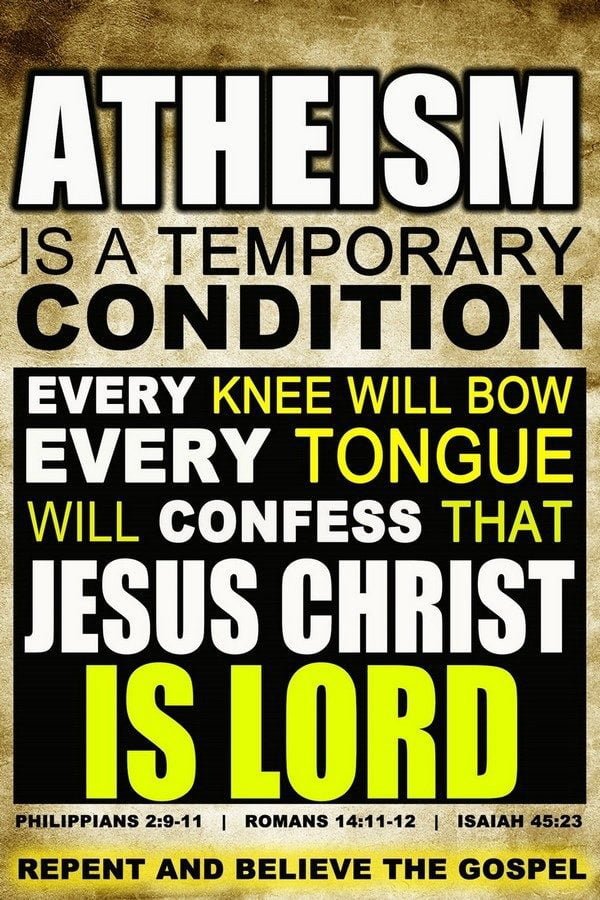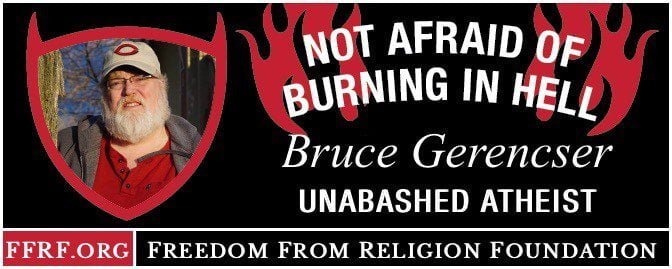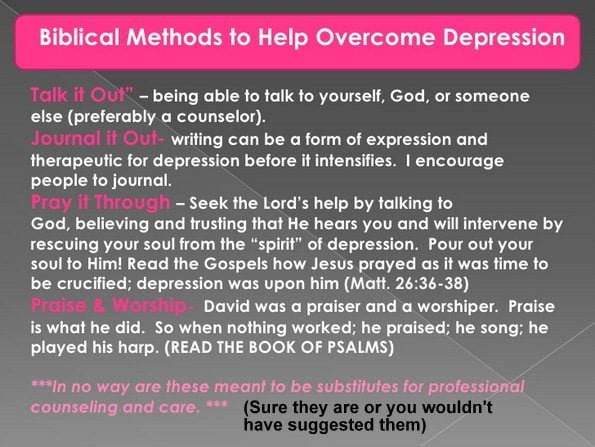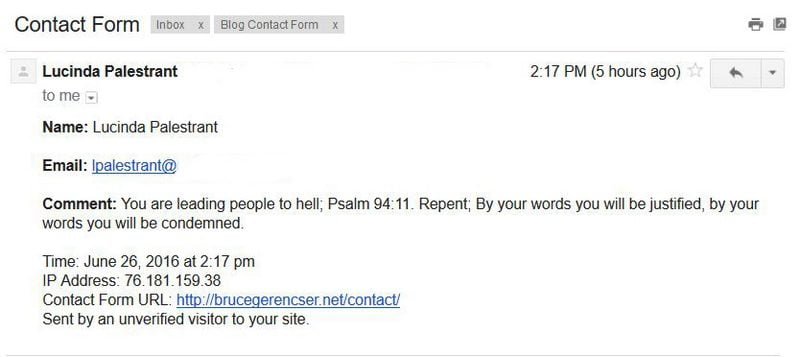
Several years ago, a man by the name of Todd W Frederick stopped by to comment on the post Why I Hate Jesus. Based on the server logs for this site, Frederick read two or three posts and the comment rules page. While it is possible he read other posts, I have my doubts Frederick showed any interest in finding out who and what I am. As you will see in a moment, Frederick has already passed judgment, saying that I am headed for an eternal ass-whooping in hell.
According to Frederick’s website, he attends Rock Springs Baptist Church in Easley, South Carolina. Rock Springs Baptist is affiliated with the Southern Baptist Convention. [Based on a mention on his business Facebook page, Frederick might attend Forestville Baptist Church in Greenville, South Carolina.] Frederick owns Whiter Than Snow Appliances, and in 2014 he ran in the primary election for District 26 County Council. He received thirty-five percent of the vote. Fredrick is also the owner of Absolutely Beachy Hair Products — an online hair paste company. (Facebook page)
Frederick has two years of Bible training via correspondence from Victory Bible College (no active website) in Roan Mountain, Tennessee and Bethany Bible College in Dothan, Alabama. Neither institution is accredited. I can say of Bethany Bible College that their curriculum is Sunday School class level. Back in the 1980s, I thought about finishing my degree through Bethany. After receiving the first materials, I was appalled to find out how weak they were academically. There are numerous such institutions scattered around the United States, offering easy paths to undergraduate and postgraduate degrees. Some of these colleges are considered diploma mills.
Frederick and his wife Heather do what he calls “harp evangelism” through a ministry titled Upstate Celestial Strings. Frederick’s wife is an accomplished harp player:
Currently Heather and her husband, Todd W. Frederick, participate in ministry opportunities with their local Baptist Church in Greenville, SC. They also enjoy working together as a team doing harp evangelism meetings for local Bible believing churches. Todd preaches a message from the Bible and Heather plays her harp. At UPSTATE CELESTIAL STRINGS, we echo the prayer of Psalm 71:22 with King David who stated:
“I will praise thee with the psaltery, even thy truth, O my God: unto thee will I sing with the harp, O thou Holy One of Israel.”
Frederick is unapologetically Christian; and not just any kind of Christian. He is a King James-only, Muslim-hating, pro-white (his business website says “call … to speak to a live “European-American” citizen), Donald Trump-supporting Fundamentalist Baptist. I encourage you to peruse the Whiter Than Snow Appliances website. Besides having an atrocious 1990s website design — as all of his websites do — Frederick makes it clear that he is a Fundamentalist Christian businessman interested in only doing business with Fundamentalist Christian South Carolinians. Are you gay? Don’t even think about shopping at Whiter Than Snow Appliances. The front page of its website says:
The Colours of the Rainbow do not truly represent Sodomites (aka-“gays” which actually means “merry” or “happy”). The sodomite terrorists hi-jacked the sign of the rainbow and claimed it as their symbol; yet, they do that which is why Jehovah-Elohim destroyed the “old world” – because of sins [II Peter 2:5 –KJV], sins that the queers celebrate! They hold to the lifestyle of Sodom! The queers have tried to pervert the rainbow which is actually a perfectly good Biblical Symbol of God’s Promise to never destroy the earth again by a world-wide flood because of wickedness; such as Homosexuality. It’s sad, but the homosexual crowd does not have a clue about happiness (joy in the Holy Ghost)… just look at their suicide rate! Even attacking each other in their perverted relationships. They’re a very sad, not gay, people group.]
I am sure local LGBTQ people flock to Frederick’s appliance business. Not only is Frederick anti-gay, he is also anti- any other religion except Evangelical Christianity, and anti- any other political persuasion except conservative Republicanism. It’s fortunate that Frederick’s business is located in Fundamentalist Baptist, Evangelical South Carolina. Almost eighty-percent of South Carolinians self-identify as Christian. Frederick’s business is located in the small town of Piedmont — the home of Piedmont Bible College (a Fundamentalist Baptist institution with 740 students) — so I suspect the percentage of Christians is even higher than in larger South Carolina. Such behaviors here in Northwest Ohio — an overwhelmingly Evangelical area — would likely result in business failure. Local Evangelicals might have similar beliefs to Frederick’s, but most of them, at least to your face, are polite. (See Local Response for some notable exceptions.)

As I read Frederick’s email to me, I was perplexed by one line: these unfortunate events were brought about by Shaitan of whom you are now obeying his humanistic teachings. I thought, at first, that Frederick had misspelled the word Satan. Nope. Frederick says, in a first for this site after 38,000 comments and thousands of emails, that I am following the humanistic teachings of Shaitan. According to Wikipedia Shaitan is:
Shayṭān is a malevolent creature in Islamic theology and mythology. They are usually assigned to the category of jinn (spiritual entities). Apart from its generic designation, used with the definite article Al-, Shaitan refers to the head of shayateen, known as Iblis.
….
The term Shaytan has the same origin as Hebrew שָׂטָן (Sātān), source of the English Satan. However Arabic etymology relates Shaytan to the root sh-t-n (distant or one who goes astray). As an adjective, it can apply to any other being. The term “Shaytan” referring to this specific creature, may either be translated as “demon” or as “devil”. In Pre Islamic Arabia this term was used to designate an evil jinni. With the emergence of Islam the meaning of ‘Shayatin’ moved closer to the Christian concept of demons.
Frederick and I, indeed, have one thing in common: both of us are following non-existent, mythical beings.
Now that you know a bit about Todd Frederick, I give you his email. I will leave it to readers to make their own judgments. I plan to un-ban Frederick so he can so respond to this post and any comments it might receive.
You reap what you sow here and in the hereafter. I was right, you are ‘Bruce Nobody’ because you are unwilling to pick fights with other cultural gods, e.g. Allah; you talk big: aren’t they imaginary, too? So just shut down your website for these whiners about baby Jesus until you and your “brainwashed” followers grow a spine and declare war on all of the followers of god(s) throughout the world, or let’s just say the gods that are worshiped in Ohio alone. Once you and your devotees to humanistic logic can offend and persuade all of those outside of your “little box” to realize they have been duped and you can “free” them, as you did for one of your female converts to atheism then you will be “Bruce Almighty.”
Furthermore, you call my comments for you to stand up against the Quran “nasty, abusive words” yet you’re permitting your fellow infidels to run rough shod over others coming to express his or her viewpoints. An example of this is from one of your devotees: “Bruce, how do you deal with assholes like this Charlie asswipe?” Yes, enjoy yourself while you can ‘Bruce Nobody’ even though you are in control now as to who you can delete or block when it comes to comments and IP addresses but the time will be soon when you’ll stand before this “imaginary god” only to find that you don’t have a delete button for the terror you’ll be facing. Mock, be cocky now and talk behind people’s back when they’re unable to defend themselves and you will be reaping this, too. Remember: Prov. 1 26 “I also will laugh at your calamity; I will mock when your fear cometh; 27 When your fear cometh as desolation, and your destruction cometh as a whirlwind; when distress and anguish cometh upon you. 28 Then shall they call upon me, but I will not answer; they shall seek me early, but they shall not find me:”
I know you don’t like it when the bible is used, except when it benefits your trite, empty arguments but how can ‘Bruce Nobody’ be so sure of what you’re espousing to even though all of the cultures of the world have some form of having a creation account, writings that depict the “gods were angered at the original parents…”, a universal flood and even the evidences of antediluvian artifacts found in archeological digs in the Middle East. So shameful that you’re destroying the possibilities that your grandchildren to be able to make a conscience choice to receive god and a home in heaven because you are so spiritually sick. Just be sick for yourself if this is what you are irresistibly drawn to but to take your family to the lake of fire with you is what’s really “nasty and abusive.”
Like it or not, the truth tells you these facts and I am now your enemy because I tell you the truth. God didn’t foreordain for you to “suffer more than Jesus did”; these unfortunate events were brought about by Shaitan of whom you are now obeying his humanistic teachings. Continue in his doctrines and you will truly understand what suffering will be but it doesn’t have to be this ending for you: Jesus suffered your sin penalty in hell, baring in his body the sins of the world; thus, making all who repent and believe on Christ to be made righteous.
God is the purest form of love: John 3:16 – KJV. Faith cometh by hearing and hearing by the word of God…
Sure makes me want to return to Christianity and follow after Jesus, right? Fundamentalists such as Frederick are only interested in hearing themselves talk. Frederick doesn’t really care about my mythical soul. All he cares about is putting a word in for Jesus. Fuck the atheists, let them burn in hell, people such as Frederick think. All that matters to such people is the preaching of their peculiar version of the Christian gospel. Little do they know or care how much damage they are causing to the Christian cause. Keep preaching, Bro. Frederick. Such beliefs and practices are partly behind the overall decline of Evangelical Christianity. Frederick might “feel” good after telling the ex-Evangelical pastor Bruce Gerencser the “truth,” but his truth is poisoning a whole generation of potential Christians and church members. I don’t need to evangelize for atheism, the Fredericks of the world are doing all the soul-saving work for me. If you doubt this to be so, consider the following review left on the Whiter Than Snow Appliances Facebook page. The reviewer is a Mormon:
Todd Frederick, the owner, was professional and helpful with our new stove, I will give him that much. We need a new dryer and fridge as well and were convinced at first that we were doing business with him further until on his way out he asked what church we attended. He did not agree with the church that we are members of and proceeded to tell us why we were wrong. As if this wasn’t bad enough, he would not stop berating us about it. He was absolutely relentless with this ridiculousness. We asked him several times to leave because he had gone well past being rude to being totally disrespectful in our own home. He not only would not leave, he had the audacity to tell us that since we were renting it wasn’t even our home. I could not believe the gall of this man. My wife and I both had to walk to the other end of the house just to get away from this man hoping he would eventually leave. The most unprofessional experience I have ever encountered. The saddest part of all this is usually when something like this happens you can walk away from the individual, but how can you walk away when the offender is right in your own living room and won’t leave when asked…simply UNBELIEVABLE!
Danny Mortimer, the Mormon missionary, just didn’t like me having some knowledge about his cult. Therefore, he has stooped so low as to smear my business. Fact is, Joseph Smith’s translations from Egyptian ancient papyri is utter nonsense and simply UNBELIEVABLE!
Here’s the true account of what occurred during the dialogue that I had with Danny Mortimer and his wife. Since Danny believes he will one day be a god, he needs to stop lying about people with whom he disagrees with. Otherwise, he will be like his brother Satan, a.k.a. in Mormon doctrine: “a spirit son of God.”
….
I simply asked Danny if he had good church to go to; he said he’s a Mormon. I said ‘I was going to invite you to Forestville Baptist Church.’ He said he attended there when he was younger but converted to Mormonism later and became a Mormon missionary. [Danny’s religion is known for challenging people themselves.] I then asked the question ‘What made you change from being a Baptist to a Mormon?’ His ans: “I studied Mormon doctrine and logically it made sense to me.” He asked me if I knew anything about Mormonism; I said ‘Yes, I studied up on Mormonism to explain what’s wrong w/ Mormon doctrine to our divorced neighbor lady w/ 3 children who were visited continually by Mormon missionaries.’ Danny asked me if I’d read the book of Mormons, I said ‘No.’ He said “You can’t speak about Mormonism until you read the book of Mormons.”
I then brought up fallacies in the Mormon doctrines, such as: How Mormons believe: “As God was, so is man and as God is, so shall man be.” Thus, they teach you can become “Gods.” They also believe that God spawns/makes “spirit babies” that are sent down to earth to inhabit human physical babies born to Mormon couples. Also teaching: each Mormon married man (even to multiple wives) will have children, being recipients of “the spirit babies.” Then after he dies, will become a “God” over his own planet, inhabiting it w/ his children and his favorite wife (who he will call up from the dead). They’ll then repopulate their planet. Thus, they will repeat the cycle that the “God in heaven is now experiencing.”’ [These doctrines are all erroneous teachings] I then asked Danny ‘Do you believe that you’ll be a “God” someday?’ To this he said “I hope so.” Then he went on to say again that I still couldn’t speak about Mormonism until I read the book of Mormon. Danny expressed anger because of the truth I was exposing about his false-religion, saying “You’re talking ‘Calculus’ when you haven’t even studied Algebra.” (Meaning: I was revealing too much about his false teachings and he didn’t like it.)
Neither Danny, nor his wife, ever once asked me to leave; instead, he asked me what I knew about Mormonism and I answered him/them. Not only are Danny Mortimer and his wife in a false religion but he’s also spreading lies about our discussion. Before I left, I told them that I also have discussed doctrinal differences with an imam (an Islamic priest) for over 2 hours (at the mosque). [Actually, I had a friendlier dialogue w/ this Imam than I experienced from Danny who exhibited much anger (being under conviction by the Holy Ghost that he’s wrong.) [I spoke w/ Danny and his wife for only about 20 minutes, making me late to church.] I ended the discussion by telling Danny that hopefully I didn’t offend him and I enjoyed our dialogue. I shook his hand and left. I’m shocked that Danny would act so child-like by ignoring our 1st Amendment Right to freedom of speech then go on and attack my business. Even the Mormons take liberties to try and make converts by incorporating opportunities into their work-a-day meetings to speak one-on-one to people they come in contact with. [Just ask anyone who has gone job hunting in Utah or Idaho.]
Jesus Christ has given the Great Commission. As a Christian, I’m to reach the lost, giving them the only hope that can bring salvation to them. The biblical Jesus Christ, God in the flesh, is that hope: Jesus Christ lived a perfect life, was crucified for our sins and was resurrected from the dead; thus, he is able save all who call upon him. Believe in Jesus Christ as Lord and you, who are sorry for your sins and repent of them, will be given the Holy Ghost. He will guide you into all truth; empowering you to live out the will of God. [You won’t become a “God.” Lucifer tried that; see where that’s gotten him.]
….
Yowzer!

Todd W. Fredrick is one of those rare birds who behaves the same way in public as he does on the internet. I have concluded that Frederick does indeed have an advanced degree; a degree in passive-aggressive behavior toward people who don’t line up with his religious beliefs. I am not against Evangelicals attempting to engage me or the readers of this blog in thoughtful discussions about God, Jesus, Christianity, the Bible, human sexuality, abortion, atheism, agnosticism, and humanism. Over a million Evangelicals have stopped by this blog over the past decade. More than ninety-nine percent of them never leave a comment or send me an email. And those who do? Most of them are argumentative, arrogant, judgmental assholes. Rare is the Evangelical who acts like a decent human being. I long ago concluded that many Evangelicals believe that I am beyond the grace of God: that as one who does “despite unto the spirit of grace” and “trods under foot the son of God,” and “considers the blood of the covenant an unholy thing” (Hebrews 10:29), I have passed a point of no return. I am a reprobate (Romans 1,2) who has committed the unpardonable sin. And since there is no chance of my return, it is okay to treat me like shit on the bottom of one’s shoes.
After a decade of such abuse, there is zero chance that I would ever reconsider the claims of Christianity — especially Evangelical/Fundamentalist/Independent Fundamentalist Baptist Christianity. Perhaps historians or archeologists will find some sort of evidence that might cause me to reconsider Christianity. Even if this unlikely event occurred, I wouldn’t return to the Christian faith. Much like an abused spouse, I would be out of my mind to return to a religion that harbors violent pathological abusers. Well, what will you say on judgement day, Bruce, when Jesus casts your sorry ass into the Lake of Fire? I will say, Jesus, many of your followers were assholes who showed me no love, kindness, or compassion. Some of them threatened to murder me, and others threatened to harm my daughter with Down syndrome. Lord, who are these people of yours? I wouldn’t want to live next door to such people, and I sure don’t want to spend eternity with them in God’s Heavenly Trump Tower®. Please, Lord, send me to hell. Let me enjoy the eternal company of Christopher Hitchens, Gandhi, my atheist/liberal Christian friends, and billions of other “sinners” who just so happened to have the wrong beliefs. I don’t like warm weather, Lord, but I will endure it as long as I don’t have to go to heaven. Thank you.
Of course, there is no Heaven or Hell. All we have is the here-and-now. And as a man who lives very much in the present, I plan to do all I can to suffocate the life out of Evangelical Christianity, or at the very least banish it to the fringes of American society. I hope you will continue to help me in this important task. We ARE making progress, as surveys show. The number of atheists, agnostics, NONES, and those who are indifferent towards religion continues to increase. The NONES are the fasting growing religious demographic in America. We ARE winning the battle, all praise be to Shaitan and Loki.
Bruce Gerencser, 66, lives in rural Northwest Ohio with his wife of 45 years. He and his wife have six grown children and thirteen grandchildren. Bruce pastored Evangelical churches for twenty-five years in Ohio, Texas, and Michigan. Bruce left the ministry in 2005, and in 2008 he left Christianity. Bruce is now a humanist and an atheist.
Connect with me on social media:
Your comments are welcome and appreciated. All first-time comments are moderated. Please read the commenting rules before commenting.
You can email Bruce via the Contact Form.










